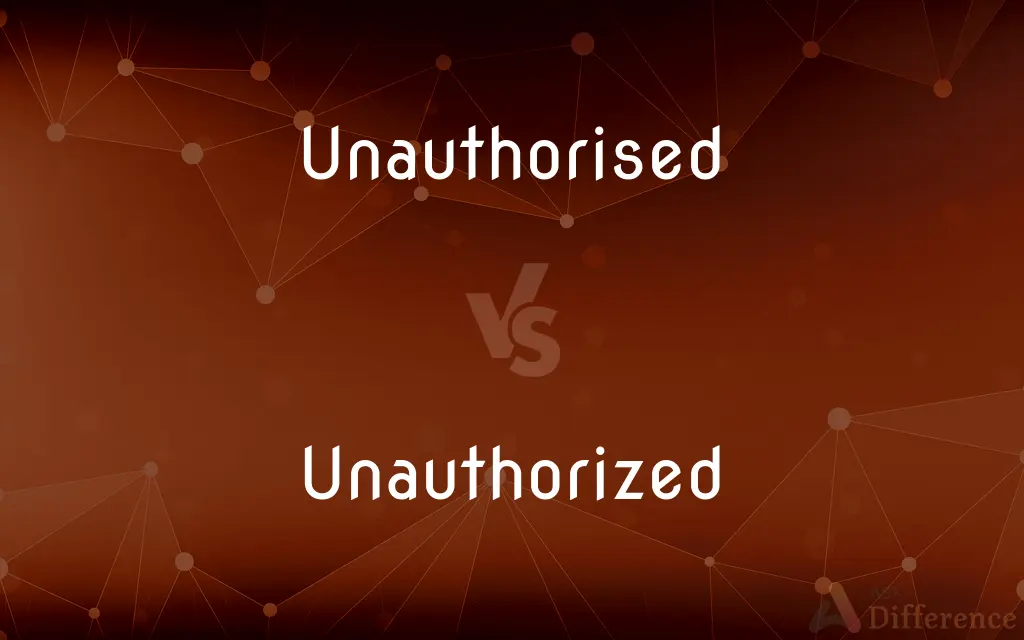Unauthorised vs. Unauthorized — What's the Difference?
By Fiza Rafique & Urooj Arif — Updated on April 7, 2024
"Unauthorised" is the British spelling, meaning not having official permission; "Unauthorized" is the American variant, with the same definition.

Difference Between Unauthorised and Unauthorized
Table of Contents
ADVERTISEMENT
Key Differences
Unauthorised and unauthorized refer to actions, access, or operations that lack official permission or approval. The distinction between the two lies in their spelling, which corresponds to the differences between British and American English. "Unauthorised" is used in contexts following British English conventions, where the spelling retains the "s," a characteristic of many words in British English that end in "-ise." Conversely, "Unauthorized" is the preferred form in American English, which typically uses "z" in "-ize" endings.
Both terms are commonly used in legal, technological, and security contexts to indicate that something is not sanctioned by the rules, laws, or protocols of an organization, system, or legal authority. For example, "unauthorised access" in British English or "unauthorized access" in American English both refer to gaining entry to a system or information without permission.
The choice between "unauthorised" and "unauthorized" depends on the intended audience or the standard spelling practice of the publication, organization, or region. While international audiences can understand both spellings, using the variant consistent with the audience's norms enhances clarity and adherence to regional linguistic preferences.
Despite the spelling differences, the pronunciation of "unauthorised" and "unauthorized" is practically identical, with variations largely due to the accent and dialect of the speaker rather than the spelling.
Comparison Chart
Spelling
British English spelling with "s".
American English spelling with "z".
ADVERTISEMENT
Usage Context
Preferred in British publications and communications.
Preferred in American publications and communications.
Meaning
Lacking official permission or approval.
Lacking official permission or approval.
Pronunciation
Similar to "unauthorized".
Similar to "unauthorised".
Application
Legal, technological, security contexts.
Legal, technological, security contexts.
Compare with Definitions
Unauthorised
Not having official permission.
Unauthorised access to the building is prohibited.
Unauthorized
Lacking approval.
Installing unauthorized apps can compromise your device's security.
Unauthorised
Lacking approval.
The use of unauthorised software is a security risk.
Unauthorized
Outside of allowed actions.
Unauthorized absences will lead to disciplinary action.
Unauthorised
British English spelling.
The document contained unauthorised changes.
Unauthorized
Not sanctioned.
Unauthorized sharing of sensitive data is a breach of trust.
Unauthorised
Not sanctioned.
Unauthorised disclosures of confidential information are punishable.
Unauthorized
Not having official permission.
Unauthorized entry to the facility is forbidden.
Unauthorised
Outside of allowed actions.
He was fired for unauthorised use of company funds.
Unauthorized
American English spelling.
The employee made unauthorized transactions.
Unauthorised
(British spelling) Not authorised; having no authority.
Unauthorized
Not having any authority
Unauthorised
Not endowed with authority
Unauthorized
Without official authorization
Unauthorised
Without official authorization;
An unauthorized strike
Wildcat work stoppage
Unauthorized
Not endowed with authority
Unauthorized
Without official authorization;
An unauthorized strike
Wildcat work stoppage
Common Curiosities
Can both spellings be used interchangeably?
While they can be understood interchangeably, the choice of spelling should align with the intended audience's regional English conventions.
What is the main difference between unauthorised and unauthorized?
The main difference is the spelling, with "unauthorised" being British English and "unauthorized" American English.
Do unauthorised and unauthorized mean the same thing?
Yes, both terms mean lacking official permission or approval.
Do these spelling differences affect comprehension in international communications?
No, the meaning of "unauthorised" and "unauthorized" is universally understood across English-speaking regions, despite the spelling differences.
Are there other examples of British vs. American spelling differences?
Yes, other examples include "colour" vs. "color" and "realise" vs. "realize", reflecting similar patterns of spelling variation.
Is one spelling more correct than the other?
Neither spelling is more correct; the appropriate choice depends on the dialect of English being used.
Can the spelling choice affect SEO or online searchability?
Yes, spelling variations can impact SEO; using the variant most likely to be searched by the target audience can improve visibility.
How can one remember which spelling to use?
Associating "unauthorised" with other British English spellings that retain the "u" or use "s" can help, as can linking "unauthorized" with American English preferences for "z".
Why is it important to consider regional spelling differences in global communications?
Acknowledging regional spelling differences respects linguistic diversity and can enhance the clarity and effectiveness of communication across different English-speaking regions.
Why do British and American English have different spellings for the same word?
The differences stem from historical spelling conventions and preferences that evolved separately in the U.S. and the U.K.
In which contexts are unauthorised and unauthorized used?
Both are used in legal, technological, and security contexts to indicate actions or access lacking official permission.
How should one decide which spelling to use?
The choice should be based on the intended audience or the standard spelling practice of the publication or region.
Does the use of one spelling over the other in a document matter?
Consistency within a document is important for professionalism and clarity, so choosing one spelling convention and sticking with it throughout is advisable.
Are there tools to help ensure consistent use of British or American spelling?
Most word processors offer language settings that can be adjusted to British or American English to assist with spelling consistency.
Share Your Discovery

Previous Comparison
Encryption vs. Decryption
Next Comparison
Mist vs. DustAuthor Spotlight
Written by
Fiza RafiqueFiza Rafique is a skilled content writer at AskDifference.com, where she meticulously refines and enhances written pieces. Drawing from her vast editorial expertise, Fiza ensures clarity, accuracy, and precision in every article. Passionate about language, she continually seeks to elevate the quality of content for readers worldwide.
Co-written by
Urooj ArifUrooj is a skilled content writer at Ask Difference, known for her exceptional ability to simplify complex topics into engaging and informative content. With a passion for research and a flair for clear, concise writing, she consistently delivers articles that resonate with our diverse audience.















































